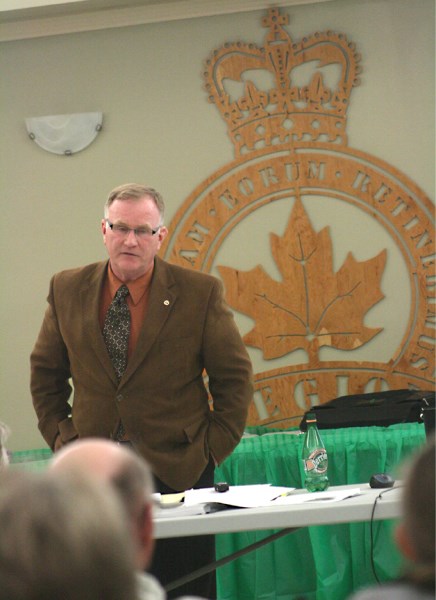Around 50 people attended a meeting held by former leader of the Alberta Green Party and self-described transmission “expert” Joe Anglin at the St. Paul Legion on Wednesday.
He said he hoped his presentation on Bill 50 transmission lines helped people learn “just how affected you are. These things have the ability to kill your community, not just hurt you individually on your land. They have the ability to put local businesses out of business.”
Anglin said he is not against transmission lines or exporting electricity, but that he is against “incompetent people approving projects that can break the back of our economy because they don’t know what they’re doing.”
The Alberta Electric System Operator (AESO) consistently estimates the cost of building transmission lines wrong, he said. “We’re being railroaded into building all of these transmission lines for the benefit of a few companies.”
Anglin claimed that AESO is not independent because the board is “hired and fired by the minister of energy. If they don’t do what the minister of energy says, what do you think is going to happen to them?”
Anglin said he favoured a natural gas distributive generation system based on “nodes,” or gas plants, saying that generators would just need upgrading. Each “node” would have stand alone capability but enough productivity to back up other “nodes.”
SRD minister’s response
“I would want to know if he knows that once you lock yourself into that, in 30 years, what’s going to be, number one the price of natural gas, and number two the availability,” said Minster of Sustainable Resource Development Mel Knight in a phone interview the same day as Anglin’s talk.
If natural gas moves off shore into a global market, “are we going to pay global market gas prices for the gas we’re burning to generate electricity in Alberta, or some other price?” asked Knight.
The base load generation of coal-fired generators serves Albertans very well, he said, adding that with some technology, CO2 emissions can be managed.
While Anglin’s presentation is “pretty slick,” said Knight, “if you do not have any background relative to what he’s talking about, I think it’s convincing.” People would be wise to take the information and round out their knowledge base with other information that is available, he said.
“Some of the things that they’re saying, particularly around Bill 50 with respect to landowner rights and so on, are just clearly not the way the real world is going to unfold,” Knight said.
Knight said government lawyers have a different legal interpretations of three former bills that have been criticized by lawyer Keith Wilson and Anglin at meetings across the province.
“We write law and then lawyers actually argue about it … and that’s why things end up going to court and so on, is to decide the interpretation of the law.”
Knight and Minister of Transportation Luke Ouellette attended one of Anglin’s presentations in Lousana on April 12. Anglin sent a letter to media the following morning claiming he had to intervene to calm down an angry audience when Minister Knight “wouldn’t admit what was obvious to the public.”
Knight called Anglin’s account “more hogwash, Anglin-style. That’s baloney.”
“The only reason he wanted to intervene was because he didn’t like what I was saying.”
The three bills targeted by Anglin and Wilson have become an issue in part because of the money paid to people who intervene at hearings on behalf of different entities, he said.
Over the years millions of dollars are paid for interventions and ends up on Albertans’ power bills, he said.
“What we’ve done is said that for four pieces of critical infrastructure, we will accept that the need was demonstrated clearly by the independent systems operator.”
Anglin said he supports the Land Use Framework and that it is different from former Bill 36. Anglin, a Vietnam veteran who moved to Canada in 2000, said the issue was not just property rights but also democratic rights.
“No one’s asking you to pick up a weapon, but if you allow this to continue on this path, somebody is going to have to … The last time people passed this type of laws it wasn’t in Canada or the United States, it was in Eastern Europe and it didn’t work out too good, and now we’re going down that road.
“We’ve got a battle on our hands, and that battle is going to come up not in this federal election, but in the next provincial election.”
Around five years ago Anglin attended a meeting about a proposed transmission line near Rimbey. “My wife made me promise I wouldn’t get involved and join anything, and I got elected that night as the leader of that group that they formed and I’ve been doing this ever since,” he recalled.
“The more I got involved, the more corrupt I saw how the system was.”
Anglin was a transmission engineer for the Bell system. He taught fibre optic engineering for several years, and was George Bush senior’s White House communications liaison for transmission, he told the audience.



